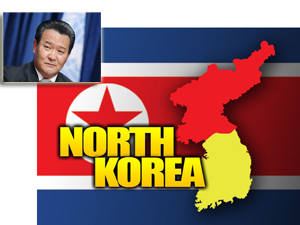By Saeed Shabazz -Staff Writer-

UNITED NATIONS (FinalCall.com) – The last time Ambassador Sin Son-ho of the Democratic People’s Republic of Korea (North Korea) held a press conference at the UN was 2010, after South Korea accused Pyongyang of sinking one of its naval ships.
So when he appeared June 21 before the UN press corps, the house was packed with scribes, television crews and still photographers. Ambassador Sin opened by calling for the dissolution of the United Statesled military command in South Korea known as the “UN Command.”
This command has nothing to do with the United Nations and is simply “a tool” of the United States, he said. “The UN Command is the United States Command in essence,” he said, adding “controversy continues regarding the legitimacy of its existence.”
“United Nations Command is an outdated alliance created in July, 1950 to legitimize the United States intervention to save the Republic of Korea (South Korea),” said Allan R. Millett, historian and director of the Eisenhower Center for American Studies in an e-mail to The Final Call.
Current defense plans for South Korea assume participation of only American and South Korean forces based on a mutual 1954 defense treaty, Mr. Millett said.
“UN Command is something that’s been there for many years– and will continue to be,” said a spokesman for the U.S. State Department June 21. The White House has not commented nor has the spokesman’s office for UN Secretary-General Ban Ki-Moon, a former South Korean diplomat.
“The U.S. military presence between 1953 and 1991 was intended to maintain the status quo during the Cold War,” according to Stratfor in a 2012 white paper entitled “The U.S. in Korea: A strategy of inertia.”
The paper noted that the U.S. strategy of maintaining troops in South Korea is tied to a historical legacy, not to the reality of the current situation on the Korean Peninsula, with the exception of the North Korean nuclear threat.
Ambassador Sin told reporters his government would not give up its nuclear deterrence program until the U.S. dissolves the command.
When President Barack Obama visited the Korean Demilitarized Zone in March 2012, he praised the strength of U.S.-South Korean relations and commended the 28,500 U.S. troops stationed there, according to Stratford, a geopolitical intelligence firm.
However, critics of Washington’s global policeman role say American tax payers are in somewhat in the dark about how much all this is costing.
According to the Statistical Information Analysis Division Center, the Dept. of Defense has “refrained” from publishing in quarterly reports how many troops are actually serving in South Korea so there is never an exact figure for what it costs taxpayers.
In 2011, the Government Accountability Office reported $13 billion had been approved for the construction of a new military facility for American troops and their dependents because the Pentagon was extending the troop tours from one year to three years. The cost of keeping troops in South Korea would increase an additional $5 billion by 2020 and $22 billion by 2050, according to GAO.
The Congressional Research Service reported April 26 that the U.S. and South Korea were expected to negotiate a new Special Measures Agreement that includes how much South Korea should pay to offset the cost of stationing American troops there.
The negotiations were scheduled to start in early 2013, conclude in the spring and have Congress approve the agreement by January 2014. The Dept. of Defense has not responded to a Final Call request for comment on the status of the negotiations.
The DOD Inspector General reports that the 2009-2013 Mutual Defense Treaty says South Korea’s share of costs for maintaining U.S. troops is $694 million, or 40 to 45 percent of the total cost.
The Senate Armed Services Committee in April said South Korea’s contribution grew by $42 million as U.S. costs grew by more than $500 million.
While the exact cost of maintaining U.S. troops in South Korea may be a little muddled, the North Korean ambassador was very clear: UN member states must “not to blindly follow United States’ policy,” he said.












